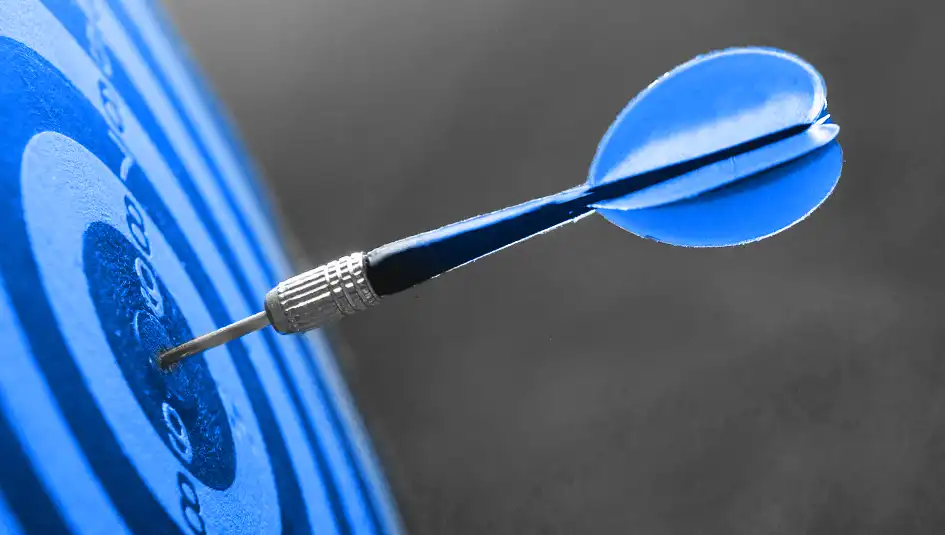Tournament Structure
To reach the final and win the World Matchplay, the players must hold their nerve and win five matches of darts. In the first round the winner is the first player to win 10 legs. The player must have beaten his opponent by two clear legs otherwise the game will continue. If the match reaches 12 legs to each player and they can’t be separated the match will go to a last leg of sudden death.
The same principle applies in the second round except this time the game is won by the first player to win 11 and win by two clear legs. Sudden death will occur if the match reaches 13 – 13. In the quarter-finals the match will be won by the first player to reach 16 legs while winning by two clear legs. A sudden death leg will be played in the event the match reaches 18 – 18.
Now four players remain in the semi-finals and this time the winner will be the first to reach 17 legs while winning by two clear legs. If the match reaches 19 – 19 then the sudden death leg decides who will play in the final. In the final a player must win by two clear legs and be the first to reach 18 legs. A sudden death leg will be played to decide who the champion is if the score reaches 20 – 20.
One leg refers to one single game of darts where the winner is the first to collect 501. The player must win a leg by landing on a double or the bullseye to reach the 501 score. Each player takes it in turns to throw three darts with a maximum score of 60 if the player lands a treble 20.
The Trophy
We mentioned the winner will pick up the Phil Taylor trophy and the reason behind its name is that Phil Taylor is the most successful World Matchplay darts player of all time. Having won the World Matchplay title on 16 occasions and being runner-up once, he retired and the trophy was rebranded to his name as a celebration of his success. With a professional career spanning from 1998 to 2018, Taylor won 214 professional titles of which 85 were major titles.
His record in the World Matchplay started in 1995 when he beat the unfortunate three-time runner up Dennis Priestley 16 – 11, when the format of the game was slightly different to the current version. He posted his win with his lowest average three dart score of 90.72 in any of the finals he played in. Phil Taylor went on a 5-year winning run between 2000 and 2004, only to go two better and post six successive wins between 2008 and 2014 creating a 38 match unbeaten run. In the 2013 final he was unplayable when he beat Adrian Lewis 18 – 13 with a three-dart average of 111.23. Adrian Lewis could count himself unfortunate as his three-dart average that day was 105.92, the best average in a final of any runner-up in a World Matchplay final.
Prior Champions
Other multiple winning champions include Rod Harrington and Michael van Gerwen who have lifted the Phil Taylor trophy on two occasions. Eight other winners of the tournament include Dimitri van den Bergh, Peter Wright, James Wade, Colin Lloyd, Peter Evison, Rob Cross, Larry Butler and Gary Anderson.
One of the closest recent finals came in 2018 when Scotsman Gary Anderson beat the first Austrian finalist, Mensur Suljovic. It was the longest final in the history of the tournament and Gary Anderson went on to win 21 – 19. Mensur Suljovic had a higher three-dart average than Gary Anderson with 104.43 against Andersons 101.12. Clearly Anderson was hitting the big shots when they were needed that day.
The 2018 tournament will also be remembered for the first-round match between Kim Huybrechts and John Henderson. It was the first time the sudden death rule was needed to determine a match since the rule was included in the event. Huybrechts ran out the eventual winner 13 – 12. The tournament was also the first time an Englishman had not made it through to a semi-final of a World Matchplay.
Talking about Englishmen let us spare a thought for James Wade. He is the player after Phil Taylor to have the most appearances in a World Matchplay final. However, he also has the record of being the losing finalist on the most occasions. In six of his World Matchplay final appearances he lost five times. Unfortunately, he was playing during the Phil Taylor years who beat James Wade four times. However, let us not dwell too much on his losses as in 2007 in his second final appearance he beat Terry Jenkins.
The most successful nationality to win the World Matchplay is English. A total of six players have won the title 22 times with the Scottish in second with two World Matchplay titles. There has only been seven nine-dart finishes during the history of the event. The most impressive were thrown in the quarter-final stage of the tournament. In 2002 Phil Taylor threw a nine-dart finish in a game where he beat Chris Mason. Gary Anderson is the most recent to throw a nine-dart finish in the quarter-final of 2018 when he beat Joe Cullen.
A game of darts can turn with one poor throw and the pressure getting to the player as they advance in the competition. However, this can make betting on the sport particularly exciting and here at mr.play, we have all you need to back your favourite players. However, it is important to always gamble responsibly and if you think you may have a problem with gambling you can contact gambleaware.co.uk for free support and advice.

 An Introduction to the UEFA Women’s Euros
An Introduction to the UEFA Women’s Euros The World Matchplay 2022 Betting Guide
The World Matchplay 2022 Betting Guide